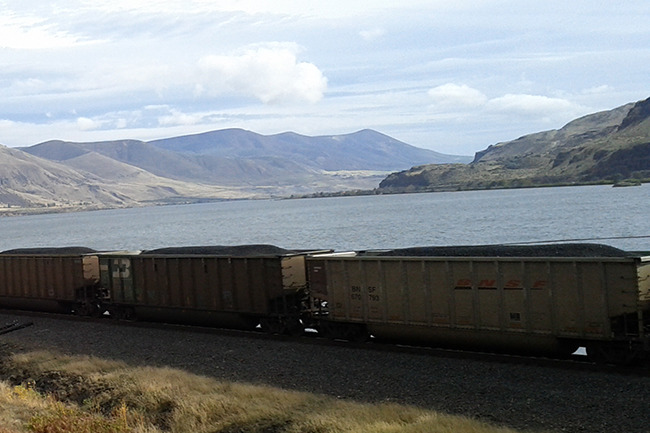“The coal dust from coal trains traveling through the Columbia River Gorge and its communities would have unacceptable impacts on air quality and the environment,” said Michael Lang, Conservation Director for Friends of the Columbia Gorge.
“The multiple findings of significant, adverse impacts that cannot be mitigated mean that Ecology and Cowlitz County should deny Millennium’s permit applications. Any other outcome would be scientifically and legally unsupported,” states Jan Hasselman, Staff Attorney with Earthjustice.
Key Findings of Millennium FEIS
View the full list and explanation of key findings here. The FEIS is used to decide whether to issue or deny permits to Millennium. The multiple findings of significant, adverse impacts that cannot be mitigated mean that Ecology and Cowlitz County should deny Millennium’s permit applications. Any other outcome would be scientifically and legally unsupported.The key findings include:
- Mitigation cannot eliminate significant adverse impacts for nine environmental resources areas: social and community resources; cultural resources; tribal resources; rail transportation; rail safety; vehicle transportation; vessel transportation; noise and vibration; and air quality.
- Greenhouse gas emissions: Simply operating this terminal would have the greenhouse gas equivalent of adding 8,300 cars to the road every year.
- Public health: Cancer risk would rise.
- Impacts to Tribes and tribal fishing: Coal trains could restrict access to tribal fishing areas on the Columbia River; terminal activities could have an impact on number of fish surviving to adulthood.
- Rail traffic impacts: Signficiant delays for public and emergency response, as well as other train traffic.
- Safety and accidents: Significant increase in risk of oil spills, rail accidents; no mitigation effort could completely eliminate possibility of an incident or the resulting impacts.
Background
The controversial coal export proposal drew close to 500,000 public comments; thousands of residents packed hearings in opposition to the project due to its wide ranging health, transportation, environmental, and economic harm. These include the loss to businesses from increased traffic congestion, increased financial burdens for communities to pay for upgrades at rail crossings, harm to commercial and recreational fisheries due to impacts to water quality from coal trains, tankers, and eight-story coal piles at the terminal site, decreased property values, and increased health care costs.The draft EIS, published in April 2016, identified many of these impacts. Local elected and community leaders, Tribes, federal and state agencies like the Environmental Protection Agency, and conservation groups will be looking for the state to more fully acknowledge these risks and harms in the FEIS.
If built, the project would mean up to 44 million tons of coal per year being shipped through the Pacific Northwest to Asia to be burned in power plants. The project would cause up to eight fully loaded coal trains a day to travel from Wyoming to Longview, distributing toxic coal dust through local communities along the way, and up to 1,680 additional bulk cargo vessels coming through the mouth of the Columbia River (the second largest river in North America) every year.
The Washington Department of Natural Resources denied Millennium one key approval in January 2017 when it rejected a necessary sublease due to the company’s unclear business plan, associated bankruptcies, prior misrepresentations, and market conditions in Asia rapidly turning away from coal and towards cleaner energy sources.
View Power Past Coal press release

